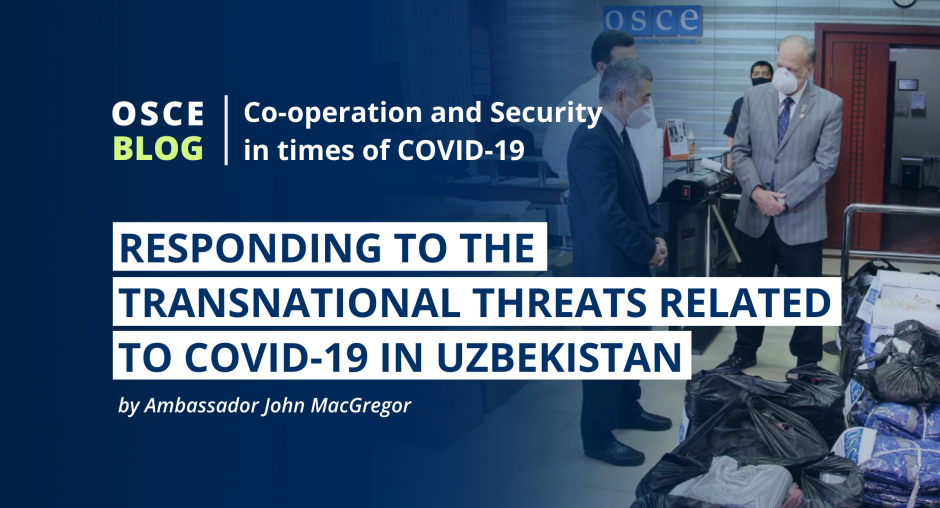Responding to the transnational threats related to COVID-19 in Uzbekistan

I nervously stood in line at Seoul’s Incheon Airport during the boarding process of what was to be the last flight to Tashkent before the precautions related to COVID-19 shut down all air traffic in and out of Uzbekistan for a period of weeks. It was near the end of March, and I was returning from Canada. As I considered the implications of the transnational threat of COVID-19, I realized that each person of the over 200 hundred boarding the flight was a threat to the national security of Uzbekistan. Although every person was wearing a mask and was temperature checked, there could be some who were without symptoms, and therefore could carry this terrible virus home if additional precautions were not taken.
This type of scene has played out across the OSCE area and around the world since February, with untold numbers of citizens wanting to return to their home countries. At the same time, there have been dozens of different responses by national governments involving quarantines and other methods of attempting to control the transnational threats of the virus.
Upon arrival, there was a very well co-ordinated system to take all the arriving passengers to a common quarantine location just outside of Tashkent city. This was a brand new facility, built in the second half of March for quarantine purposes. It is still filling an important role in managing the transnational threat effects of COVID-19 for all persons arriving in Uzbekistan. The mandatory 10 to 14 day quarantine has drastically reduced the opportunity for the spread of the virus, and has been an important part of the national strategy.
Of course, all of the hours in the air across the Pacific Ocean and eastern Asia had given me much time to think about the OSCE’s role in helping deal with the multi-dimensional effects of COVID-19, and more specifically what could be done by the Project Co-ordinator in Uzbekistan (PCUz).
In fact, the PCUz had already started work to determine what assistance could be rendered, consistent with OSCE commitments, to mitigate the transnational threat posed by COVID-19 in Uzbekistan. During my first Vancouver/Tashkent Zoom meetings with PCUz staff, we had initially discussed working from home to keep the staff safe, and then carried on to how we could respond, as an OSCE field operation.
Those Zoom meetings among me and the PCUz staff carried on during my own 14-day quarantine-upon-arrival in Tashkent. We found ourselves focusing on the immediate needs of our project partners. The Police on the streets of Tashkent, who were enforcing ‘stay at home’ measures were urgently in need of more protective equipment, so that they could avoid becoming virus-spreaders during their necessary interaction with the public. The staff of the Ombudsperson institution were in need of protective equipment so that they could continue their important work in monitoring closed institutions for women and juveniles, some of the most vulnerable in society. The PCUz met the challenge, and within weeks, we were able to procure the needed material and provide it to our partners.
Throughout our internal PCUz discussions and deliberations on what our role should be in fighting the transnational threats related to COVID-19, we considered that the safety of people and their health are part of the OSCE’s comprehensive approach to security. This approach has been reflected in how PCUz has responded to the crisis of COVID-19.
There are of course many other considerations to be made in how the PCUz should respond. As the PCUz staff continued working from home (without break from mid-March to end-August, and likely beyond, as currently planned), we considered how we could adapt our current projects and also what new projects could be envisaged to combat the transnational threats to the OSCE’s comprehensive approach to security.
Some examples of new or revised projects include working with partners to offer more resources and protection to victims of domestic violence (which has been shown to be on the increase, internationally, during the pandemic). The PCUz has also stepped up efforts with national partners to increase vigilance and support to combat trafficking in persons. There have been some new efforts by the PCUz to help with the implementation of the Advance Passenger Information system to help with traveler monitoring. We have also engaged with national partners to pursue options for assisting with small and medium enterprises, particularly women entrepreneurs, who can help resume growth and improve resilience to recover from what has become the worst worldwide economic disaster in many generations.
As I reflect on what COVID-19 means to the OSCE and its participating States, I realize that in our responses, we have demonstrated that the OSCE and its 57 participating States play a vital role in providing a comprehensive and multilateral response in times of crisis. We at the PCUz are finding new ways to assist the government of Uzbekistan and continue the confidence-building measures through adjusting the programmatic work to this new reality and challenges. Indeed, 2020 has proved that the OSCE mandate of comprehensive security covers more than responding to conflict and that the health, safety and security of people is and remains a top priority for the OSCE and its field operations.

